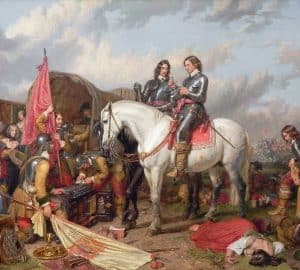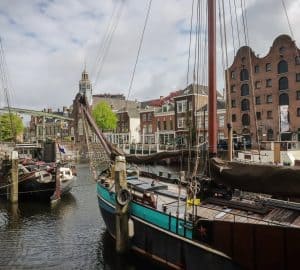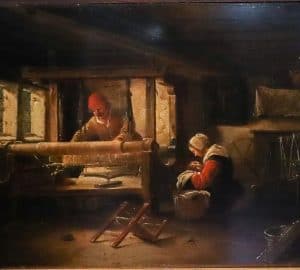Ulrich Zwingli is typically remembered as a reformer, leading the city of Zurich during the Protestant Reformation. However, he was also a soldier and a statesman. He worked for much of his life to try bring the Protestants together in political unity to stand against the Catholic forces, which he saw as trying to destroy them. It was this aspect of his life that would lead him astray, eventually resulting in his death at the Battle of Kappel.
At that time, the country of Switzerland was a collection of various cantons, or states, formed into a loose federal union. With the arrival of the Reformation, some of these cantons converted to Protestantism, while the rest remained Catholic. This soon became a point of political division within the country. In 1524 the five Catholic cantons of Lucerne, Uri, Schwyz, Unterwalden and Zug formed an alliance called the Five States or the Five Cantons. With encouragement from Zwingli, the Protestant cantons reacted by forming their own Christian Civic Union, made up of Zurich, Constance, Berne, Basel, and other smaller cities. Tensions quickly escalated, and the Five Cantons formed an alliance with Catholic Austria. The Catholic states promised the death penalty to anyone who started a new sect not authorized by the church, and Austria promised to support them with the sword.
At this point Switzerland was tottering on the brink of religious division. In 1529 they almost resorted to fighting in the First Kappel War. Jacques Keyser, a pastor from just outside Zurich, was captured by the Catholics and burned alive for heresy. Zwingli urged for war to avenge his death, and to force the Catholics to allow the free preaching of the gospel. He wrote a pamphlet in which he said:
Let us be firm, and fear not to take up arms. This peace, which some desire so much, is not peace, but war: while the war that we call for is not war, but peace. We thirst for no man’s blood, but we will clip the wings of the oligarchy. If we shun it, the truth of the Gospel and the minsters’ lives will never be secure among us. … Undoubtedly, we must trust in God alone; but when He gives us a just cause, we must also know how to defend it, like Joshua and Gideon, shed blood in behalf of our country and our God.
The Catholics and Protestants both raised armies and marched towards each other, meeting at Kappel, on the border between the cantons of Zug and Zurich. But before a battle began, the Federal Diet was successful in negotiating peace. It was agreed that each city would decide whether to be Catholic or Protestant, and liberty of conscience, though not liberty of preaching, would be guaranteed everywhere. Zwingli protested that the agreement resolved little, and that it just gave the Catholics time to strengthen themselves to crush the Reformation. However, he was ignored, and the First Kappel War was concluded without bloodshed.

Zwingli continued to be worried about the future of Protestantism. He saw powerful Catholic forces marshalling to destroy them. The Holy Roman Empire and other Catholic nations had far greater military resources than the scattered Protestant states in Germany and Switzerland. He believed that Charles, the Holy Roman Emporer, was both working to increase his power over the German nobility and crush the Reformation. He saw Charles as a tyrant, and believed that Christians had the responsibility to resist him. He wrote:
A single individual must not take it into his head to dethrone a tyrant; this would be a revolt, and the kingdom of God commands peace, righteousness and joy. But if a whole people with common accord, or if the majority at least reject him, without committing any excess, it is God himself who acts.
This doctrine of resisting tyranny was part of the Swiss Reformation theology, and it can be traced through Calvin’s Geneva, Knox’s Scotland and Cromwell’s England, to the establishment of the United States of America in our War for Independence.

As Zwingli worked for unity, he began to compromise. At this time France was Catholic, and the same government persecuted Christians. However, they were enemies of Emperor Charles for political reasons, and Zwingli wrote to try to get them to unite with the Protestants. He was pragmatically looking for protection through the French military and resources, rather than maintaining Biblical principles of not uniting with non-Christians and trusting God for protection.
Tensions were still hot in Switzerland. Zwingli and the other Zurichers believed that action had to be taken about the Catholics before they strengthened their position. In a meeting on May 12th, 1531 they could not convince the other Protestants to resort to violence. Instead they decided to put a trade embargo on the Catholic cantons, and stop them from importing any food. They did not have the Biblical grounds to begin a just war, so they incited one by trying to starve the Catholics. This was the worst of both worlds. Unless the situations could be resolved with negotiating, they would be giving the Catholics a just cause to make war to feed their families, without having the advantage of being the first to strike.
Zwingli did not agree with this decision, and preached sermons in his church calling for greater action. But instead of calling people to repentance, he was urging them to begin an unjust war for pragmatically political reasons. This was not well received by the people of Zurich. The blockade was unpopular, and Zwingli was losing much of his influence. He told them:
I see that the most faithful warnings cannot save you; you will not punish the pensioners of the foreigner. [That is the Catholics, who unified with Austria] … A chain is prepared … it unrolls link after link, – soon will they bind me to it, and more than one pious Zuricher with me …. It is against me they are enraged! I am ready; I submit to the Lord’s will. But these people shall never be my masters…. As for thee, O Zurich, they will give thee thy reward; they will strike thee on the head. … But God will not the less preserve His World, and their haughtiness shall come to an end.
As the blockade took its effect, the Catholics began to feel the twangs of famine. With no food for their families, their men prepared for war. Their armies gathered at Lucerne, and the passes were guarded to prevent word from reaching Zurich. Some warnings did get through, but they were ignored.
Finally on October 9th, with the soldiers of the Five Cantons already on the march, the council of Zurich realized their danger. With no time for troops from other cities to reinforce them, and with the city in disorder, they gathered what troops they could to resist the invasion. Some 2,000 men reached Kappel, where the Catholic army had camped. Zwingli marched at the back of the army as a chaplain, armed as was traditional with a sword and halberd. He believed that he was destined to die in the coming battle, and was prepared to meet his fate.
As the Catholics advanced towards the Protestant position on October 11, 1531, they began by sending out a formal declaration of war. The Zurichers’ position was weak. They were outnumbered and their position did not allow them to easily retreat. “It is now too late to retire with honor,” one said. “This day is in the hands of God. Let us suffer whatever He lays upon us.” They had adopted an unbiblical fatalistic view. They believed that God had ordained for them to be defeated, so they hastened to fight the battle without using wisdom to have a chance at victory. They should have retreated from the bad position at Kappel and tried to rally more of their men. There was a time to stand when the cause seemed hopeless, but that would be on the walls of Zurich, not on the border. This mistake sowed the seeds for their defeat.
At 1 pm an artillery barrage began. At the time cannons were not very effective, and the firing stretched out for most of the afternoon. This allowed more reinforcements to arrive from Zurich, including Zwingli himself. As they approached the field, he said:
How can we stay calmly upon these heights, while we hear the shots that are fired at our fellow-citizens? In the name of God I will march towards my brother warriors, prepared to die in order to save them.
As afternoon turned into evening, the Catholic commanders planned to make camp for the night without attacking the army of Zurich. However, John Jauch of Uri found a grove of beech trees that allowed his musketeers to approach close to the Protestant lines. His men opened fire with their Arquebuses and hit some of the Zurichers. The Protestants were ordered to charge. “Warriors!” Zwingli exhorted them, “Fear nothing. If we are this day to be defeated, still our cause is good. Commend yourselves to God!”

The Protestants drove the Catholics out of the grove of trees, but the rest of the Catholic army took the opportunity to advance and catch the Protestants unawares. As the armies joined, word spread among the Zurichers that they were surrounded. No doubt this was assisted by the dour and fatalistic predictions that had been made that God had planned for their defeat. Fear spread through their ranks, and they began to flee from the field, crying that they were betrayed. The Zurichers suffered heavy losses, 561 were killed, including 7 members of the small city council, 19 members of the Council of Two Hundred, and 25 Protestant pastors.
Zwingli was one of those soldiers who was killed. As the story is recorded, he was bending down to console a dying soldier when he was struck on the head. Four times he tried to rise, and four times he was again wounded. “What matters this misfortune?” he murmured, as he lay dying under a pear tree, “They may indeed kill the body, but they cannot kill the soul!” With the battle won, some Catholics roamed the battlefield torturing the wounded to force them to call for help from the saints. By this time Zwingli was unable to speak, but he shook his head, refusing to confess to a priest. One Captain finally recognized him, and ran him through the throat with the cry of “Die obstinate heretic!” The Catholics later held a mock trial for heresy, found him guilty of treason, and quartered and burnt his body.

Not long after the Battle of Kappel, peace was concluded between the two sections, with both left to practice their own religion. Much can be learned from this defeat. The Protestants did not have just cause for war, yet they incited conflict with the Catholics by cutting off their food. Christians are called to give the hungry food and protect the fatherless, but at that time they were taking food from their enemies for political reasons. When war finally came, they had a healthy view of the sovereignty of God, acknowledging that He would control the outcome of the battle. But they misunderstood their responsibility. Believing that they understood what God’s will would be, they adopted a self-fulfilling fatalism that led them to fight in a bad position with a weak army and nurtured the fear that spread through their forces, leading them to their final defeat.

Further Reading
Much of the source material for this post comes from History of the Reformation in the Sixteenth Century by Jean-Henri Merle d’Aubigné.





What a sad Christian history
Just found your article while searching for more information on today’s Christian History installment on Zwingli. It was very useful.